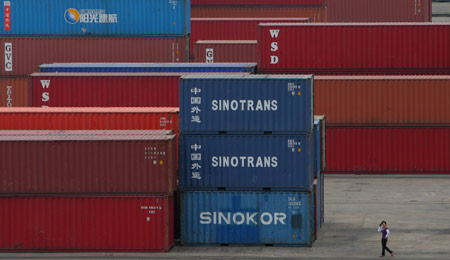Economy
China to strive for economic balance
By Lan Lan (China Daily)
Updated: 2010-04-16 09:53
 |
Large Medium Small |
A container port in Nanjing. Exports are yet to see a strong growth due to the fragile global recovery. [China Daily]

Imports set to shine as export rebound may take time
BEIJING - The nation will strive to achieve a trade balance, but there would be other trade deficits during the first-half of the year as domestic growth outpaces the global recovery, Yao Jian, spokesman for the Ministry of Commerce, said on Thursday.
Yao said external demand is yet to show a clear rebound and that in turn would lead to a slow recovery in China's exports.
At the same time the nation would look to achieve the trade balance by going in for more imports.
"The trade surplus is expected to narrow by $100 billion this year," he said. China had a trade surplus of $196 billion last year.
Allaying concerns over the March figures, Yao said the deficit was well within expectations and part of the government efforts to strike a balance.
The government had in 2008 said it would look for trade balances from investment, consumption, exports and imports.
Exports hit a rough patch in 2008 after the global financial crisis, as the US and European markets virtually dried up. That in turn forced the government to take more steps to boost domestic consumption.
The major markets have not shown the kind of recovery that we would have expected. But we are confident that things would improve over the next two to three years, Yao said.
The massive stimulus plan launched by the government helped bolster domestic investment and consumption. At the same time it also triggered the need for more imports, said Li Jian, an economist with the research institute under the Ministry of Commerce.
The import appetite grew as most of the stimulus plan projects were for infrastructure and transport, sectors needing power and raw materials like steel in huge quantities, Li said.
But the silver lining for imports came in the form of the steps taken by the government like tariff cuts for certain categories such as high-tech. At the same time steps to reduce the procedural norms have also helped boost imports, said Li.
Foreign companies who saw China only as a manufacturing base are now realizing the vast untapped potential that exists within the country, said Li Xiaogang, a researcher on overseas investment at the Shanghai Academy of Social Sciences.
More and more export-oriented foreign companies are shifting to a "made in China for China" strategy, Li said.
The current trade scenario and the soaring raw material prices in global markets also contributed to a shrinking trade surplus, said Yao.
"Imports have increased more sharply than exports as Chinese economy remained on a strong footing," Yao said.
During the first quarter of the year, imports surged 64.6 percent year on year, much higher than the 28.7 percent growth rate for exports. The trade surplus stood at $14.5 billion, down 76.7 percent over the same period last year.
| ||||
"Currency is an issue of one nation's sovereignty and China will make appropriate arrangements and choices according to the changing internal and external economic situation," he said.
Yao said the government will strengthen checks on soybean oil imports. The new measures will not affect the normal trade, Yao said, in response to recent reports that China has stopped importing Argentine soybean oil.
"China and Argentina are very important trade partners. The issue would be resolved by both sides through negotiations," he said.













